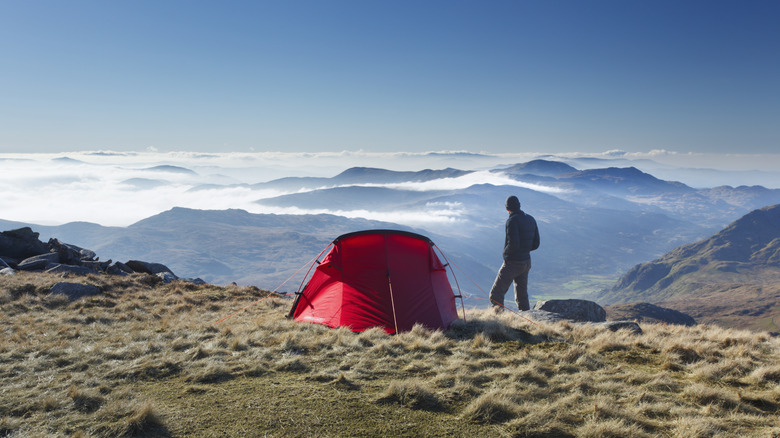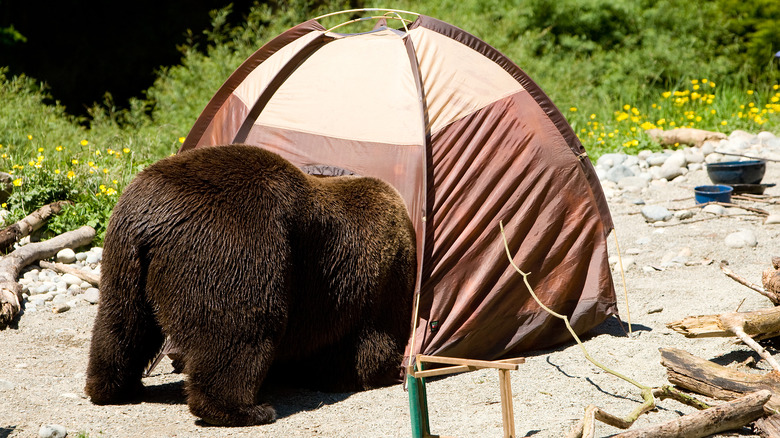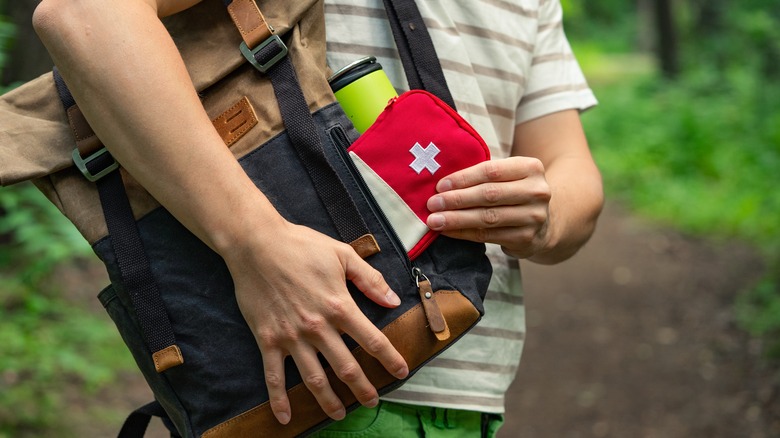Why Wild Camping Excursions Aren't The Right Fit For Everyone
We may receive a commission on purchases made from links.
Wild camping is an incredible way to immerse yourself in nature, but it might not be the right choice if you're looking for a relaxing vacation. While outdoorsy travelers love the feelings of freedom, solitude in nature, and the spirit of adventure that comes with exploring unfamiliar terrain, the experience isn't without its challenges. Wild camping is sometimes referred to as free or dispersed camping and usually involves hiking into the wilderness and setting up camp somewhere remote without designated campsites or amenities.
You can find wild camping opportunities all over the world, and many of the most beautiful national forests in America allow people to hike and camp for free. It's an unforgettable experience, but travelers who are brand new to outdoor adventures might feel a little intimidated about setting off into the wilderness.
If it's your first time trying hiking or camping, you might want to consider starting out at an established campground before you try wild camping. While most people are able to enjoy the experience without any major issues, it can be dangerous if you're unprepared. If you aren't afraid of a little risk and you're looking for a thrilling adventure in nature, then you should definitely consider wild camping. If you're someone who values safety, comfort, and relaxation, then staying at an established campground might be a better fit.
Wild camping can be dangerous and uncomfortable
One of the things outdoor enthusiasts love most about Mother Nature is that she is unpredictable. You're almost guaranteed to experience something delightfully surprising when you venture off the beaten path, but sometimes the surprises are less than enjoyable.
During my first major backpacking trip through Nantahala National Forest, the weather changed abruptly, and I ended up stranded in a blizzard without the proper gear for cold-weather camping. Luckily, we were just steps away from the iconic Appalachian Trail, and happened to find an empty trail shelter where we were able to hunker down for the night. Similarly, a friend of mine once hurt her ankle while camping in the backcountry at Red River Gorge –– a dream destination for climbers and hikers in the state of Kentucky –– and was forced to hike for miles to get medical attention. She wasn't able to call for help due to the lack of cell phone reception. Everything turned out okay in both situations, but things could have taken a dangerous turn quickly.
Along with inclement weather and unforeseen injuries, there are plenty of other dangers that can occur while wild camping. You'll be sharing space with many animals who call the beautiful wilderness landscapes home. While most animals are more afraid of you than you are of them, they can become dangerous when threatened. Depending on where you're camping, you may encounter creatures like bears, mountain lions, and venomous snakes. In addition to potential dangers, you'll also have to be ready for some discomfort. You'll have to carry all of your camping gear, which can be very heavy, and there won't be any facilities like bathrooms and showers along the way. Prepare for close contact with plenty of bugs, too. If you're someone who enjoys a bit more luxury and relaxation, you might not enjoy wild camping.
Proper preparation is key
If the tales of bears, snakes, bad weather, bugs, and broken ankles haven't put a damper on your enthusiasm, you're probably ready to embark on your first wild camping adventure. Your next step is going to be ensuring that you're well prepared for everything Mother Nature throws at you.
Spend some time reading up on some basic survival skills that everyone should know before your trip. That way, if something were to happen to you or one of your fellow campers, you'd know how to handle the situation and make it out of the wilderness alive. Purchasing a quality first aid kit is crucial, but if you really want to be prepared, consider searching for one that is specifically designed for outdoor adventures. Adventure Medical Kits makes some ideal options that may come in handy during your wild camping trip. The Mountain Series Mountaineer kit costs around $235 and has enough supplies to treat more than 200 different medical issues. It's designed for up to ten people and is stocked for 28-day trips.
A whistle is another great item to pack for safety. They're small, lightweight, and an excellent way to send out a distress signal if you need help. If you run out of water, a Lifestraw can be lifesaving in the backcountry. The small straw filters out bacteria, parasites, microplastics, dirt, and sand from freshwater sources. Cell phones aren't always reliable, so don't count on them when wild camping. Bring a map and a compass. If you're traveling in extremely remote regions, you may want to invest in a satellite GPS device. Don't forget to pack basics like flashlights, waterproof clothing, extra batteries, fire starters, and a good multitool. Make sure to do a little research about the kinds of wildlife you'll encounter and whether you should bring heavy-duty insect repellent or bear spray.


